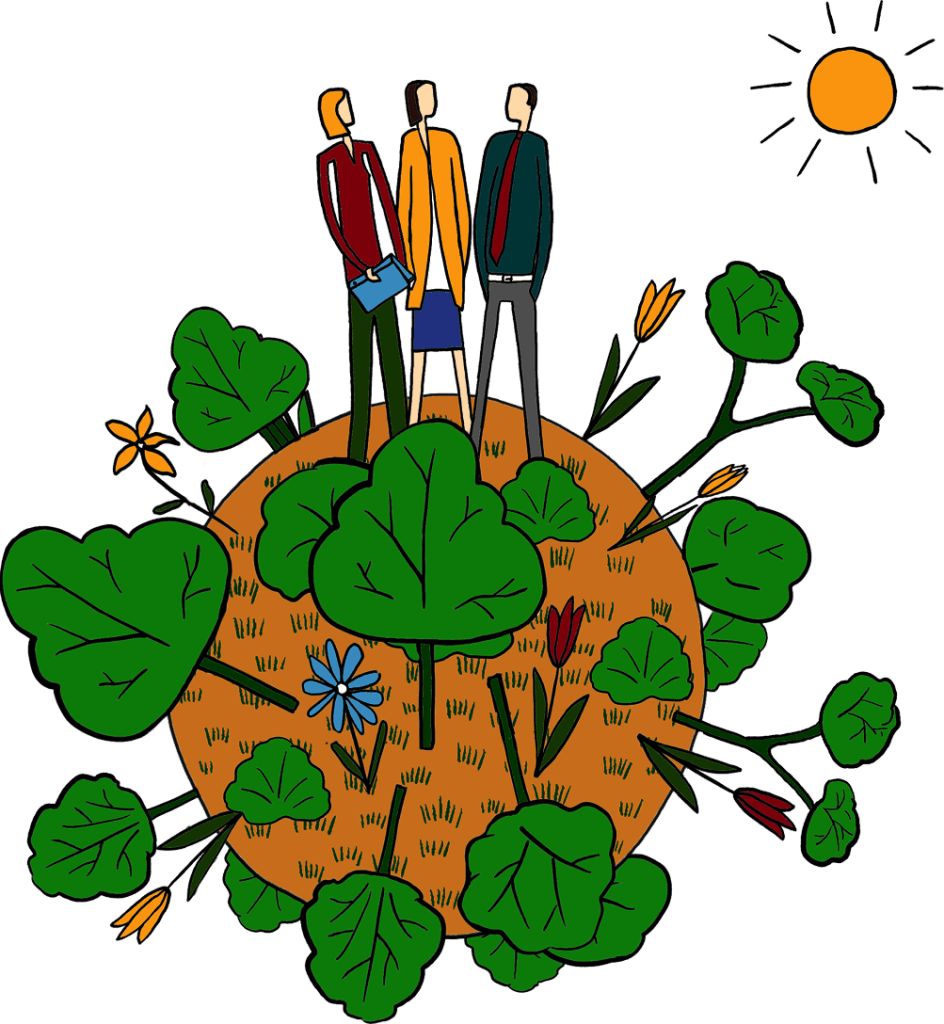
Moving more together: Our social commitment | #bemovendo
Taking responsibility and making a lasting impact
For us, entrepreneurial activity and social responsibility go hand in hand.
In our work with people and organisations, we experience time and again how powerful and sustainable the feeling of self-efficacy is for development and change. These successes are deeply inspiring and fill us with pride. However, it is a sad reality that in many regions of the world, self-determination and personal development opportunities are severely restricted by difficult living conditions.
Particularly in East Africa, large parts of the population have no access to clean water, a basic human right. Although hard to imagine for us, this affects women and children in particular, who often have to spend hours collecting water. As a result, they are unable to access education, school, and find paid work. As change enablers, this is not a situation we can simply accept. For us, taking responsibility means taking active action as global citizens and making a sustainable contribution that creates real equality of opportunity.
We want to make a difference, even if the challenges are not right on our doorstep. That is why we as a company take responsibility, because where basic necessities of life such as clean water, sanitation and hygiene are lacking, fundamental support is needed to enable real change.
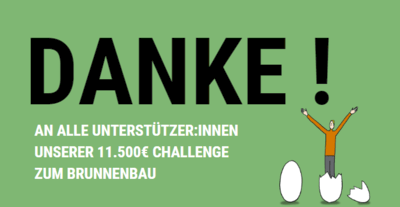
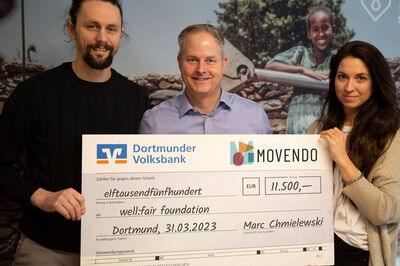
Movendo donates a fountain to mark its 10th anniversary.
To mark our 10th company anniversary, we launched an important initiative. In collaboration with well:fair (Neven Subotic Foundation), we launched a fundraising campaign for the construction of a water extraction point. And it was a great success! Thanks to the active support of our employees, customers and project partners, we were able to reach the donation target of 11,500 euros for the first Movendo well by the end of 2022.
From now on: step by step to the finished fountain
The fact that this donation amount was made available is an initial step on the long journey to the first Movendo well. Once the project has been assigned by the foundation and a local partner organisation has taken responsibility for managing the process, the next steps are to prepare the ground, such as involving the affected community and carrying out geological surveys. This forms the basis for the concrete localisation of the water extraction point, followed by the actual drilling. It can take up to 1.5 years before the borehole is successfully drilled and the much-desired water extraction point is available for the people of Tanzania.
Our collaboration with well:fair (Neven Subotic Foundation)
Our long-standing partnership and personal relationship with well:fair (Neven Subotic Foundation) has strengthened our confidence in the foundation’s work, as have its robust and transparent processes. This is why our initiative with the foundation will not remain a one-off campaign. In addition, the success of our first fundraising campaign has encouraged us and it feels right and sensible for us to bundle our activities here in order to make a socially relevant contribution as global citizens for real, effective change.
Senior partnership
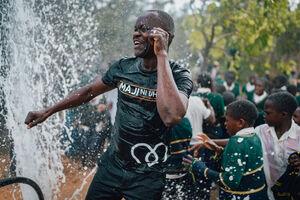
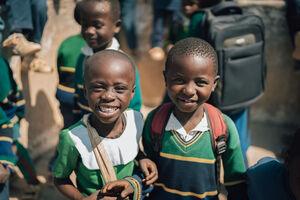
Pro bono projects
Since 2020, Movendo has also been involved in a content-related collaboration with the foundation. Through pro bono projects, we support and accompany the foundation’s team in its organisational development and transformation.
Become a donor for a second Movendo fountain!
By joining forces, we can give even more people a better future. Your donation helps people who lack the most basic things: water, sanitary facilities and hygiene. As a donor, you will of course also receive a donation receipt from well:fair (Neven Subotic Foundation).
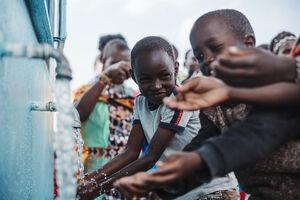
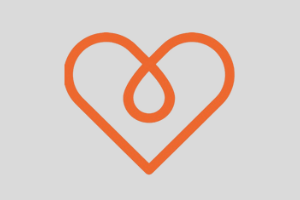
well:fair (Never-Subotic-Foundation)
The foundation enables the construction of wells and sanitary facilities for schools and communities in Ethiopia, Kenya and Tanzania. Access to clean water, sanitary facilities and hygiene – WASH for short – is the key to ensuring that children attend school regularly. Education gives children the chance to lead a self-determined life.
Become a donor for a fourth Movendo fountain!
By joining forces, we can give even more people a better future. Your donation helps people who lack the most basic things: water, sanitary facilities and hygiene. As a donor, you will of course also receive a donation receipt from well:fair (Neven Subotic Foundation).

Project trip to Tanzania in 2023
Day 1 - Departure
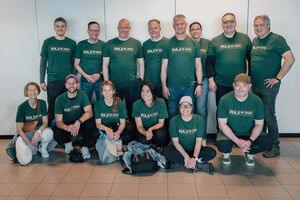
Today marks the start of my project trip to Iringa in Tanzania, for which I have been preparing intensively together with the other group participants. We have been working on development cooperation, the conditions in Tanzania and, of course, clean drinking water and sanitation as the basis for a life in health and dignity. Having unfortunately missed the preliminary meeting, I am delighted to meet the first supporters, ambassadors and the well:fair foundation team (Neven Subotic Foundation) here. The group for our project trip is completed in Amsterdam. We have a 14-hour flight ahead of us, which we all use to make our first personal contacts and the anticipation of the trip is absolutely confirmed. It’s great to embark on this journey with a group of very different people with the same attitude. We all share a passion for the foundation’s WASH work, because access to clean water is a human right! That’s what it says on our T-shirts: Maji ni uhai – water is life!
Day 2 - Dar es Salaam
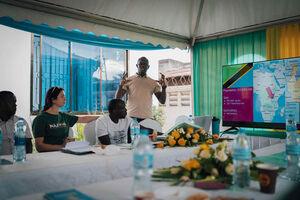
On the first day of our project trip, we visited the German embassy in the morning and the well:fair (Neven Subotic Foundation) partner organization PDF People Development Forum in the afternoon and gained many exciting insights into the current and future WASH work in Tanzania. When in a country of 64 million people only between 30% and 50% have secure access to clean water, it takes no more than that to understand that the realization of the human right to clean water is THE decisive change. Who needs perspective: 30-40 million people (half of the German population – i.e. one in two of your friends) have no access to what we use every day, even for flushing the toilet. In conversation with the ambassador, it became very clear to me that state development cooperation certainly creates essential framework conditions and at the same time NGOs and above all local partner organizations, in their agility and active participation at eye level, are the indispensable building blocks for truly effective development in the communities. I am now looking forward to experiencing this valuable, appreciative and value-creating cooperation between the communities, the PDF and the well:fair (Neven Subotic Foundation) on site in Iringa.
Day 3 - Transfer to Iringa
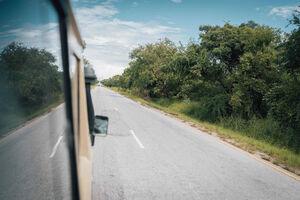
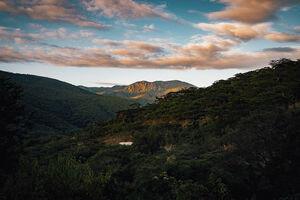
Day 4 - Life without clean water
Igomtwa is very rural, secluded and far from a paved road. Cars don’t normally come here. Today is a rare exception: at the invitation of the community, we have set off to get to know the people and life in this place. So we are announced and expected, and the reception is overwhelming. 200 people welcome us with music, dancing and singing and I am immediately swept away by the warmth, joy and energy. The children sing “Karibu” (welcome) and “Water” and I follow the rhythm as best I can.
The 2295 inhabitants of Igomtwa have no water or sanitation supply. The necessary amount of drinking and process water is taken from a water point that is about 30 minutes’ steep walk from the houses – each way. Laundry is also done here and cows and wild animals come here to drink. It is clear that they also leave their excrement there. The community members know that the water makes them sick. Although their bodies are used to the daily strain, severe and life-threatening diarrhea occurs again and again, especially in children. But there is no alternative. And since life doesn’t work without water, this water MUST be taken.
We learn how the entire community is actively involved in the WASH project right from the start and that this approach by well:fair (Neven Subotic Foundation) really makes the difference compared to other well construction projects. Participation ensures commitment and sustainable use, because access to clean water will change the lives of the entire community. We experience exactly how the change begins when we accompany the women of the community to fetch water. 40 minutes downhill and then 40 minutes uphill again with 20 liters of water. I am completely out of breath and women and children here do this twice a day. Just being able to use this time independently will change the community. Fortunately, as soon as the rainy season ends, concrete drilling work will begin to provide access to clean water for the people of Igomtwa. At the same time, there are still so many communities that are waiting for this change and until then have to use water that is heavily contaminated. Even though I have just been there, it is still unimaginable!
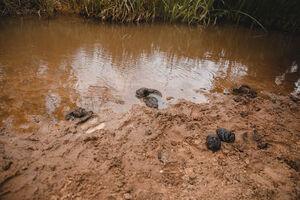
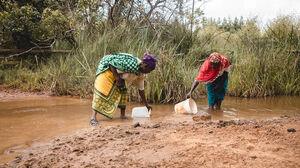
Day 5 - Flushing in Ibatu
The 1329 people living in and around Ibatu have been looking forward to this special day for many weeks: after many weeks of joint planning and preparation, the future well was drilled. It is the day when the water comes to the surface for the first time and is available from now on – clean, without effort and almost unlimited. So today I have the great honor and absolute pleasure of being present at the flashing. This is the moment when the groundwater shoots up through the borehole from a depth of 130 meters for the first time. This main borehole will provide 10,000 liters of water per hour.
If we apply the UN standard of 20 liters of water per person per day, then 500 people per hour can be supplied with clean water here. Together with the communities involved, pipeline systems are now being built to 4 further extraction points. This will eventually give 1400 people in Ibatu and the inhabitants of the neighboring community access to clean water. We all dance together to the tune of “Karibu” (welcome) and “Maji ni uhai” (water is life) and enjoy the wonderful reception. The welcome speeches make us all realize what access to clean water means for the people in the Ibatu community. “We will get health and dehydration will disappear. The teachers are looking forward to continuous school attendance by the children, who will no longer have to help fetch water. And the sanitary facilities will ensure that the girls can continue to attend school during their menstruation.
Drilling has been going on here since March, 130 meters below the surface, and just as the community and we arrive, water shoots to the surface for the first time. A fountain of 30 meters pours down on us. Then there is no stopping us. The festival begins. Beaming faces everywhere and everyone dances under the rain that will change everyone’s lives. Children, women and men jump over the borehole and I hug my fellow travelers, the PDF team and some members of the community. There is pure joy. Everyone is shouting “Maji” (water), dancing, laughing and hugging each other.
Day 6 . Conclusion with a WASH project
Over the last few days, we have seen what life is like without access to clean drinking water and sanitation. Our travel group agreed that the consequences of these living conditions are unacceptable and that no one should be denied the right to water and hygiene. We want to see what actually happens once the wells and sanitary facilities have been built at Nzivi Primary School.
A complete WASH project was completed here a month ago. The available 3300 liters per hour supply the 800 pupils and the 9,500 members of the community in Nzivi. The associated sanitary facility not only ensures hygiene, but also enables the older girls in particular to attend school continuously, as they can use a separate cubicle to provide themselves with sanitary products during their menstruation and dispose of them there directly. The pupils proudly show us how the sanitary facilities work and demonstrate their hygiene concepts. We learn lots of details about the water supply and disposal, hygiene standards and sanitary facilities. Everything is perfectly thought out and forms a sustainable cycle because, for example, the ash from the incinerated sanitary products is used as fertilizer. The project has been supported by the community’s WASH Committee right from the start. The community members are actively involved in all the construction work for the water supply, and everyone is trained in the use of clean water and hygiene. (The children show us the five steps of hand washing in a dance.) The school has a WASH Club and the 100 members take care of the maintenance of the sanitary facilities. Small repairs and the entire maintenance of the water supply are carried out locally by the community. It is noticeable everywhere that there is an extremely high level of responsibility for the water supply and sanitary facilities. This is achieved and secured through the consistent involvement of the entire community. For us at Movendo, this sounds so logical because we work just as systemically in our projects and I can see from the example here that this attitude and principles also make the decisive difference in development cooperation.




